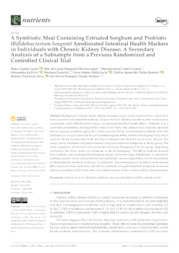A symbiotic meal containing extruded sorghum and probiotic (Bifidobacterium longum) ameliorated intestinal health markers in individuals with chronic kidney disease: a secondary analysis of a subsample from a previous randomized and controlled clinical trial.
A symbiotic meal containing extruded sorghum and probiotic (Bifidobacterium longum) ameliorated intestinal health markers in individuals with chronic kidney disease: a secondary analysis of a subsample from a previous randomized and controlled clinical trial.
Autoria: LÚCIO, H. G.; LOPES, R. de C. S. O.; GOMES, M. J. C.; SILVA, A. da; GRANCIERI, M.; DELLA LUCIA, C. M.; QUEIROZ, V. A. V.; SILVA, B. F. da; MARTINO, H. S. D.
Resumo: Background: Chronic kidney disease increases uremic toxins concentrations, which have been associated with intestinal dysbiosis. Sorghum bicolor L. Moench has dietary fiber and bioactive compounds, while Bifidobacterium longum can promote beneficial health effects. Methods: It is a controlled, randomized, and single-blind clinical trial. Thirty-nine subjects were randomly separated into two groups: symbiotic group (SG), which received 100 mL of unfermented probiotic milk with Bifidobacterium longum strain and 40 g of extruded sorghum flakes; and the control group (CG), which received 100 mL of pasteurized milk and 40 g of extruded corn flakes for seven weeks. Results: The uremic toxins decreased, and gastrointestinal symptoms improved intragroup in the SG group. The acetic, propionic, and butyric acid production increased intragroup in the SG group. Regarding ?-diversity, the Chao1 index was enhanced in the SG intragroup. The KEGG analysis revealed that symbiotic meal increased the intragroup energy and amino sugar metabolism, in addition to enabling essential amino acid production and metabolism, sucrose degradation, and the biosynthesis of ribonucleotide metabolic pathways. Conclusions: The consumption of symbiotic meal reduced BMI, improved short-chain fatty acid (SCFA) synthesis and gastrointestinal symptoms, increased diversity according to the Chao1 index, and reduced uremic toxins in chronic kidney disease patients.
Ano de publicação: 2024
Tipo de publicação: Artigo de periódico
Unidade: Embrapa Milho e Sorgo
Palavras-chave: Gut microbiota, Microbiota intestinal, Refeição simbiótica, SCFAs, Sorghum Bicolor, Sorgo, Symbiotic meal, Toxinas urêmicas, Uremic toxins
Observações
1 - Por padrão são exibidas publicações dos últimos 20 anos. Para encontrar publicações mais antigas, configure o filtro ano de publicação, colocando o ano a partir do qual você deseja encontrar publicações. O filtro está na coluna da esquerda na busca acima.
2 - Para ler algumas publicações da Embrapa (apenas as que estão em formato ePub), é necessário ter, no celular ou computador, um desses softwares gratuitos. Sistemas Android: Google Play Livros; IOS: iBooks; Windows e Linux: software Calibre.
Acesse outras publicações
Acesse a Base de Dados da Pesquisa Agropecuária (BDPA) para consultar o acervo completo das bibliotecas da Embrapa.

